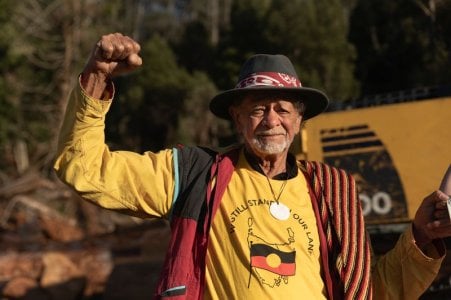Discover the Controversial Acts of an Aboriginal Elder Who Defies the Law—and Why Police Can't Stop Him!
- Replies 32
In a world where the rule of law is often seen as the bedrock of society, there are those who challenge its universality and applicability, particularly when it comes to indigenous rights and environmental activism. One such individual is Jim Everett-Puralia Meenamatta, an 81-year-old Aboriginal elder, who has become a figure of controversy and admiration for his staunch refusal to recognize the jurisdiction of Australian law over himself and his actions.
Jim Everett-Puralia Meenamatta's story is not just about a series of rogue acts; it's a narrative deeply rooted in the history and ongoing struggle of Aboriginal Tasmanians. His recent defiance of a court order to appear before a magistrate over charges related to anti-logging protests has sparked a conversation about sovereignty, environmental stewardship, and the clash between colonial and indigenous laws.

Everett, a respected elder and a Pakana Plangermairreenner man, has been a vocal advocate for the protection of Aboriginal lands from logging and other forms of environmental degradation. His actions, supported by the Bob Brown Foundation—an environmental action group led by former federal Greens leader Bob Brown—highlight a broader movement that seeks to preserve the natural heritage and cultural significance of Tasmania's forests.
The elder's refusal to appear in what he calls a 'colonial court' is a statement that resonates with many indigenous Australians. He asserts that the British, and consequently Australian, laws were imposed on Aboriginal Tasmanians without consent, and therefore, he does not recognize their legitimacy over his sovereign rights to protect his country.
This stance has led to a second arrest warrant being issued for Everett, but enforcing it poses a challenge. The elder resides on the remote, Aboriginal-owned Bass Strait island of Cape Barren, a vast area where locating and apprehending him is no simple task. Moreover, his commitment to his cause is unwavering, as he has expressed a willingness to face the consequences of his actions, whether they be fines or jail time.
Everett's actions and the support he receives from figures like Bob Brown and Nala Mansell, the campaign manager of the Tasmanian Aboriginal Centre, underscore a broader debate about the intersection of indigenous rights and environmental activism. Mansell has called for the trespass charge against Everett to be dropped, arguing for flexibility in the application of laws that govern Aboriginal people and their cultural responsibilities.
The elder's life work, which includes poetry, plays, political and academic papers, and short stories, is a testament to his deep connection to his heritage and the land. He speaks of the generational trauma experienced by Aboriginal communities due to the destruction of their country, a sentiment that fuels his determination to protect it.
As our members, many of whom have witnessed significant social and legal changes over the decades, reflect on this issue, it's important to consider the complexities of governance, law, and cultural heritage. Jim Everett-Puralia Meenamatta's story is not just about defiance; it's about the enduring quest for recognition and respect for Aboriginal laws and ways of life.
 We invite you to share your thoughts on this matter. Have you encountered similar stories of indigenous activism in your community? How do you think such conflicts between traditional laws and modern legal systems should be resolved? Your insights are valuable, and we look forward to a robust discussion in the comments below.
We invite you to share your thoughts on this matter. Have you encountered similar stories of indigenous activism in your community? How do you think such conflicts between traditional laws and modern legal systems should be resolved? Your insights are valuable, and we look forward to a robust discussion in the comments below.
Jim Everett-Puralia Meenamatta's story is not just about a series of rogue acts; it's a narrative deeply rooted in the history and ongoing struggle of Aboriginal Tasmanians. His recent defiance of a court order to appear before a magistrate over charges related to anti-logging protests has sparked a conversation about sovereignty, environmental stewardship, and the clash between colonial and indigenous laws.

Aboriginal elder Jim Everett-Puralia Meenamatta defied legal authorities by failing to appear in court for anti-logging protest charges in Tasmania. Credit: Facebook / Bob Brown Foundation
Everett, a respected elder and a Pakana Plangermairreenner man, has been a vocal advocate for the protection of Aboriginal lands from logging and other forms of environmental degradation. His actions, supported by the Bob Brown Foundation—an environmental action group led by former federal Greens leader Bob Brown—highlight a broader movement that seeks to preserve the natural heritage and cultural significance of Tasmania's forests.
The elder's refusal to appear in what he calls a 'colonial court' is a statement that resonates with many indigenous Australians. He asserts that the British, and consequently Australian, laws were imposed on Aboriginal Tasmanians without consent, and therefore, he does not recognize their legitimacy over his sovereign rights to protect his country.
This stance has led to a second arrest warrant being issued for Everett, but enforcing it poses a challenge. The elder resides on the remote, Aboriginal-owned Bass Strait island of Cape Barren, a vast area where locating and apprehending him is no simple task. Moreover, his commitment to his cause is unwavering, as he has expressed a willingness to face the consequences of his actions, whether they be fines or jail time.
Everett's actions and the support he receives from figures like Bob Brown and Nala Mansell, the campaign manager of the Tasmanian Aboriginal Centre, underscore a broader debate about the intersection of indigenous rights and environmental activism. Mansell has called for the trespass charge against Everett to be dropped, arguing for flexibility in the application of laws that govern Aboriginal people and their cultural responsibilities.
The elder's life work, which includes poetry, plays, political and academic papers, and short stories, is a testament to his deep connection to his heritage and the land. He speaks of the generational trauma experienced by Aboriginal communities due to the destruction of their country, a sentiment that fuels his determination to protect it.
As our members, many of whom have witnessed significant social and legal changes over the decades, reflect on this issue, it's important to consider the complexities of governance, law, and cultural heritage. Jim Everett-Puralia Meenamatta's story is not just about defiance; it's about the enduring quest for recognition and respect for Aboriginal laws and ways of life.
Key Takeaways
- An Aboriginal elder, Jim Everett-Puralia Meenamatta, defied legal authorities by not showing up in court for charges related to anti-logging protests in Tasmania.
- A new arrest warrant has been issued for Everett, who maintains that Australian law does not hold jurisdiction over him as an Aboriginal person protecting his country.
- Everett claims that formal agreements for Aboriginal citizens to follow Australian laws have never been made, emphasising his sovereignty over such laws.
- Despite potential consequences, including jail time, Everett intends to continue protesting against logging activities and argues for the recognition of Aboriginal laws and sovereignty.







